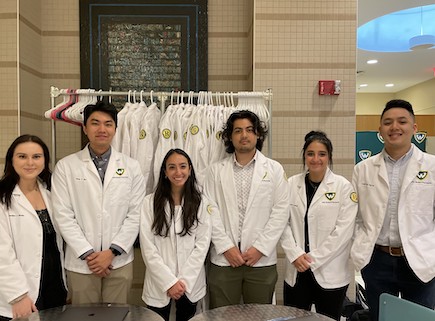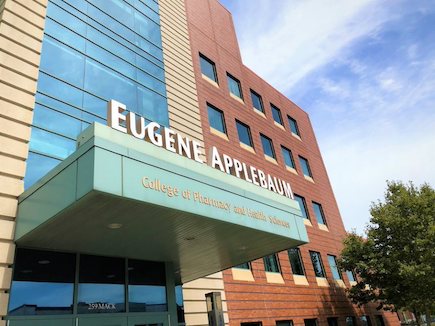Wayne State Doctor of Pharmacy program earns full accreditation through 2031-32
The Accreditation Council for Pharmacy Education (ACPE) has continued full accreditation of the Wayne State University Eugene Applebaum College of Pharmacy and Health Sciences Doctor of Pharmacy program through June 2032.

The ACPE notified WSU President Kimberly Andrews Espy, PhD, and WSU Applebaum Dean Brian Cummings, PhD, of the full accreditation on Feb. 6.
“I am thrilled, and not surprised,” said President Espy. “I have every confidence in our Doctor of Pharmacy program to educate and train tomorrow’s health care professionals, who upon graduation will immediately begin making a difference in communities here in Detroit, as well as across the state and nation. Our faculty and staff members demonstrate a strong commitment to community health care and this accreditation is affirmation of our impact.”
ACPE found the program to be in compliance with all 25 of its standards. The full eight-year accreditation is the maximum period granted.
“I want to express my thanks to everyone who contributed to this very positive outcome and to the PharmD Self-Study Steering Committee for their leadership of the process," said Dean Cummings. “I share President Espy’s pride in your hard work and accomplishments.”

Preparation for the ACPE’s October 2023 site visit began months in advance with the commissioning of a PharmD Self-Study Steering Committee, which was chaired by Associate Clinical Professor of Pharmacy Practice Justine Gortney and consisted of faculty, staff, preceptors and students.
The resulting accreditation news comes as WSU Applebaum celebrates 100 years of pharmacy education in the heart of Detroit.
“Everyone in the department worked incredibly hard to demonstrate our program’s quality,” said Associate Dean for Pharmacy Susan Davis. “During their site visit last fall, ACPE evaluators said they were impressed by our integrated curriculum, our experiential program, our excellent preceptors, and the collegiality they felt among our faculty and staff. Above all, they were impressed by our well-informed and diligent students. We felt they concluded their visit with very positive impressions of our program and their time in Detroit — and the fact that they awarded us the maximum accreditation confirms that we accurately exemplified the excellence each of us strives toward every day.”
That dedication to well-prepared health care professionals and post-graduation success is in line with Wayne State’s College to Career initiative, which seeks to provide every student with experiential learning opportunities that allow them to encounter the world, gain deeper insights and new perspectives, and prepare for prosperous careers.
“Our graduates scored in the top 25 on the 2023 NAPLEX [North American Pharmacist Licensure Exam] — their 87% pass rate for first-time test-takers was 8.4% higher than the national average among 144 schools of pharmacy,” Davis said. “This is numbers-based proof that Wayne State pharmacy students are among the best in the country.”
The Doctor of Pharmacy program at Wayne State University is a four-year curriculum in the heart of Detroit. Approximately 100 students are enrolled in each year of the program. WSU Applebaum information meetings for prospective students take place at 6 p.m. on the first Tuesday of each month. The application process for the Doctor of Pharmacy program begins each July.
An anchor in urban health care
The Eugene Applebaum College of Pharmacy and Health Sciences is built on more than 100 years of tradition and innovation in the heart of Detroit. We have grown deep roots in our city, harnessing its powerhouse hospital systems and community service organizations as vibrant, real-world training grounds for students, with an ongoing focus on social justice in health care. And our research at all levels – from undergraduates to veteran faculty members – translates into creative solutions for healthier communities.
Wayne State University is a premier urban research institution offering approximately 350 academic programs through 13 schools and colleges to nearly 24,000 students.